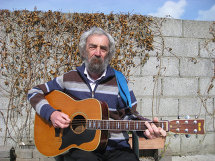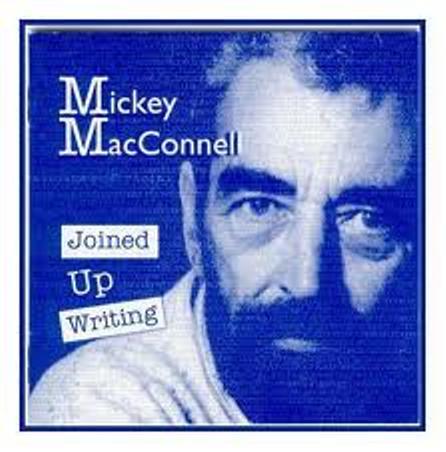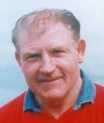Mickey MacConnell
| Been composing since he was 18 years old |  |
“Well, Mattie” he said, “I can’t remember that there was any one particular thing that sparked it off. Except that growing up in south Fermanagh was a very melancholy time. And it was a sort of spiritual Chernobyl in many ways; in that every day you went out you’d be running into B-Specials on the road and they’d be asking you your name and who you were despite the fact that they were neighbours of yours. And there was a general sort of disillusionment and disappointment. And I think what really triggered it was looking at the older generation; people of my father’s age and my mother’s age and seeing this terrible apathy and acceptance of a society that was totally dominated by a sectarianism and a bigotry. And being young- it was the sixties- and all sorts of revolutions were happening. It was, I suppose, an expression of an anger that knew nowhere to go and it came out of that."
He is modest about the success of Only Our Rivers Run Free. “It’s a question of writing the right song at the right time and having it recorded by the right person.”
Christy Moore recorded it on his first Planxty album in 1971 and Mickey credits Christy with its success, “Because Christy’s career was taking off in a big way it afforded an authority and a whole importance to the song . . suddenly it became an anthem for the dispossessed and assumed an importance that I had not necessarily seen. And it has gone on to be regarded almost as a traditional song; a universal song.”
His advice to young songwriters? “Keep trying. It happened to me. It could happen to you.”
For many years, along with his two brothers he worked as a journalist in the Capital. This experience is summed up in the opening lines of his
For twenty frantic, fruitless years
I worked in Dublin town,
Reporting for newspapers
I was busy writing down
All the words of politicians
In the endless quest for truth . . .
He was a great friend of the late John B. Keane but when I point out that John B. said that it is easier to write in Listowel than not to write, the man from Ballinaleck replies, ”I would disagree with John B. there. I need anger to write and I think that perhaps when you are living among very friendly, very sociable, very contented people it’s inclined to drain any bit of anger and any bit of angst out of your Soul.”
| Joined Up Writing |  |
What Mickey thought of John B. comes across vividly in the following song which he wrote shortly after the great playwright’s death:
Footprints of John B There is nowhere quite so lonely as a silent darkened stage
When the footlights have all dimmed and died and the props are put away
But our town felt just as lonely as May turned into June
When God finally rang the curtain down and called our playwright home. But you cannot kill a rainbow nor turn back the rising sun
Nor undo the works of gifted men even though their day is done
For they always walk beside us when the things they had to say
Are a part of what we were and are and form the centre of our ways
Chorus
So search for him in Market Street, Pound Lane or in the Square
Or late afternoon in Church Street – sure you’ll likely find him there
Or where the laughing sparkling silvery Feale sweeps westward to the sea
There you’ll follow in the shadow of the footprints of John B.
He always seemed to hear a tune that others seldom heard
As he walked through his beloved streets or in the woods of Gurtinard
He would pause and talk to children knowing each and every name
Of their seed and generation and the place from where they came.
And the countrymen he wrote about – the corner boys and knaves
Slipped from reality to printed words and then to actors on the stage
And their language that he captured, all the things they had to say
Meant the man who loved his native town never really went away.
Chorus
So search for him in Market Street, Pound Lane or in the Square
Or rounding Scully’s corner, sure you’ll surely find him there
Or where……..etc
All the poets and the writers came to say a last goodbye
As did the actors and the critics, the mighty and the high
As they mingled with the townsfolk on his last sad journey home
Then each and everyone knew well we were parting with our own.
But I take comfort from the shadows for shadows mean the sun still shines
To light the clouds above us and the ones that fog our minds
So each time the pen confronts the sword for the likes of you and me
There you’ll find the gentle shadow and the spirit of John B.
ChorusKieran Goss who accompanied Mickey on albums says, “I’m delighted to see somebody writing about Mickey.” He refers to Mickey’s “sheer perspective” and “sheer humanity.” With reference to Mickey’s penchant for keeping a low profile Kieran points out the positive side to such reticence “ . . .it means there is no commercial pressure on what he produces.”
So search for him in Market Street, Pound Lane or in the Square
Or somewhere out by Markey’s Bridge, You’ll surely find him there
Or where the……….etc
Cormac MacConnell, a noted songwriter himself, says he is “ sick, sore, and tired of being asked 'Are you a brother of Mickey?'".
The last word must go to Kieran Goss, “He writes with an honesty and a passion that I have rarely heard . . .we need more songwriters like Mickey McConnell.”

|
LINK: For details of Mickey’s albums |






No comments:
Post a Comment